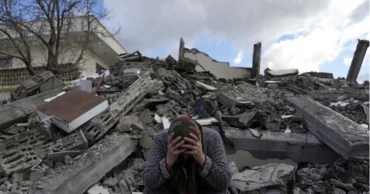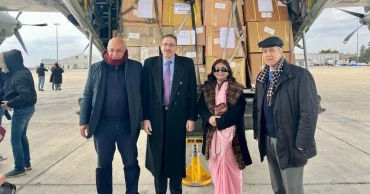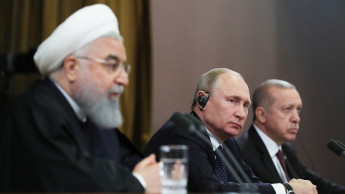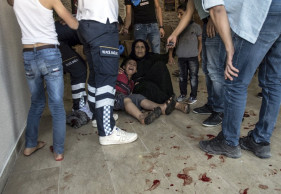Syrian
Germany detains Syrian suspected of planning Islamist attack
German authorities have detained a Syrian man on suspicion of planning to carry out an explosives attack motivated by Islamic extremism, officials said Tuesday.
Federal police said officers detained the 28-year-old man early Tuesday in the northern city of Hamburg.
Investigators say the man is suspected of trying to obtain substances online that would have allowed him to manufacturer an explosive belt “in order to carry out an attack against civilian targets.”
Police say the man was encouraged and supported in his action by his 24-year-old brother, who lives in the southern town of Kempten. The men, whose names weren't immediately released, are described as being motivated by “radical Islamist and jihadist” views.
Authorities said they had no information indicating a concrete target for the planned attack.
Police searched properties in Hamburg and Kempten, seizing large amounts of evidence including chemical substances, officials said. Some 250 officers were involved in the operation.
Germany's top security official thanked police, saying their actions “have prevented possible Islamist attack plans.”
Interior Minister Nancy Faeser said the case showed that the danger of Islamic extremism remained high and pledged that German security agencies would continue to take all information about such threats seriously.
“Germany remains a direct target of Islamist terrorist organizations," she said. "Islamist-motivated lone perpetrators are another significant threat.”
2 years ago
UN appeals for $397 million to help Syrian quake survivors
The United Nations chief launched a $397 million appeal Tuesday to help nearly 5 million survivors of last week’s devastating earthquake in rebel-held northwest Syria who have received very little assistance because of deep divisions exacerbated by the country’s 12-year war.
Secretary-General Antonio Guterres announced the appeal a day after he welcomed an agreement between the U.N. and Syrian President Bashar Assad to open two new crossing points from Turkey for an initial period of three months. The U.N. has only been allowed to deliver aid to the northwest Idlib area through a single crossing at Bab Al-Hawa -- at Syrian ally Russia’s insistence. Since the quake, the U.N. says 84 trucks have gone through Bab Al-Hawa.
Guterres said the devastation from the magnitude 7.8 earthquake that ravaged southern Turkey and northwestern Syria on Feb. 6 “is one of the worst in recent memory,” and “we all know that lifesaving aid has not been getting in at the speed and scale needed.”
He said the $397 million will provide “desperately needed, life-saving relief for nearly 5 million Syrians — including shelter, health care, food and protection” for three months.
Guterres said the U.N. is in the final stages of preparing an emergency appeal for quake-ravaged southern Turkey. U.N. spokesman Stephane Dujarric said the appeal will be launched “probably in the coming days.”
He urged the international community to provide the emergency funding without delay, saying: “The human suffering from this epic natural disaster should not be made even worse by manmade obstacles — access, funding, supplies.”
The secretary-general said aid to Syria must get through by all routes to all areas without restrictions.
Read more: Rising toll makes quake deadliest in Turkey's modern history
A senior U.N. World Food Program official warned that food insecurity in afflicted parts of Syria had been rising drastically even before the earthquake struck.
“It was very bad before. Now it’s dramatic,” said Corinne Fleischer, the agency’s Middle East Director.
“Half of the population faces hunger. And that’s the worst that we’ve seen since the beginning of the crisis in Syria. Even at the height of the war, we didn’t have 12 million people food insecure,” she said in an interview with the Associated Press.
Guterres announced that an 11-truck convoy was on the move to go through one of the newly opened crossings at Bab Al-Salam, “with many more to come.” He said the second new crossing at Al Raée is also open, “and goods are flowing.”
Dujarric said the convoy went through the crossing without any obstacles and “we’re very optimistic that things will move quickly.” He noted that the two crossings have been used by relief organizations not affiliated with the U.N. and the roads are in better condition than those leading to Bab Al-Hawa.
The announcement of the two additional crossings from Turkey came as the U.N. Security Council was meeting for the first time Monday afternoon on the difficulties of getting aid to northwest Syria.
The U.N. has also been trying to send a convoy to the northwest across conflict lines within Syria, but it hasn’t gotten a green light from all parties. The convoy has reportedly been blocked by Hayat Tahrir al-Sham, a rebel group with ties to al-Qaida that controls part of the northwest.
France’s U.N. ambassador, Nicolas De Riviere, told reporters before Monday’s council meeting that there were two options — either the Syrian government grant additional access to the northwest or the council would try to adopt a resolution authorizing additional crossing points to the region.
After the meeting and the announcement of the two new crossings, De Riviere said there should be no “obstacles” to delivering aid through the three crossings. If there are, he said, the Security Council should look into adopting a resolution under Chapter 7 of the U.N. Charter, which means it can be enforced militarily, to authorize the crossings and get aid to the millions in need.
U.S. Ambassador Linda Thomas-Greenfield said the United States will be watching closely to see if aid is getting to Syrians in need and will push for a U.N. resolution if it isn’t. “It took seven days to get this decision to allow the borders to be open -- that decision should have been made on day one,” she said.
Secretary-General Guterres, asked about a possible meeting with president Assad, said what’s needed now is not high-level visits that divert resources but stepped-up relief efforts.
“I am following that very, very closely,” he said, “and whenever it would be useful and positive, I am ready to do whatever is needed.”
As for whether a Security Council resolution is needed, he reiterated that the two new crossings are open, “and we will see, of course, if the situation would change, we would adopt the necessary measures.”
3 years ago
For Syrian women, quake adds disaster on top of war’s pain
Draped in a heavy wool shawl against the cold, Ayesha dragged her feet, her toddler granddaughter trailing behind her, as they made the 15-minute walk from her tent to the nearest bathroom in a nearby building, the only place they have to wash.
Seven days after the earthquake leveled their home in the northwest Syrian town of Atareb, the 43-year-old still has no access to water, electricity or heat for her and 12 family members, all crammed into a single tent.
“When I look at our house, I wonder how did anyone come out alive?” Ayesha said. “Maybe it would have been better if I died,” she added. “I came from under that rubble carrying the rubble of the whole world on my shoulders.”
She doesn’t know how much more she and other Syrians can take. Women in particular have shouldered the responsibility of keeping shattered families together during the past 12 years of civil war. The conflict and economic collapse left millions of people dependent on international aid. Now added to the litany of hardships is destruction from the earthquake, which killed tens of thousands and left millions homeless in southern Turkey and northern Syria.
Also Read: Newborn saved from rubble in quake-hit Syria in good health
With hospitals swamped by quake victims, Ayesha can’t get medical services to treat and monitor her liver disease. She and her husband both lost their sources of income in the quake. His taxi was crushed, and her stock of clothes that she once sold to neighbors was destroyed.
They have nothing to provide for their six children and their five grandchildren, including two she took in after one of her sons was killed in the war. They have to share mattresses to sleep in their tent.
“If hardships are a sign of the love of God, it means God really loves the Syrian people,” Ayesha said, breaking out in tears. Like most women in this conservative community, she spoke on condition her last name be withheld.
Also Read: After quake, war-hit Syrians struggle to get aid, rebuild
Their tent is in a camp for quake victims in Atareb, part of the last opposition-held territory in northwest Syria, which has seen bombardment and fighting for years. Walking between rows of destroyed homes in the town, it is hard to distinguish which collapsed from the quake and which from intense military operations at the height of fighting.
Syria’s war has loaded a particular burden and isolation on women, with so many men who were killed, detained, maimed or forced out of the country. The number of female-headed households across Syria increased by around 80% to comprise more than a fifth of households in 2020, according to the U.N.
Even before the quake, over 7 million women and girls across Syria needed critical health services and support against physical and sexual violence. Child marriage was on the rise, and hundreds of thousands of girls were out of school.
The immediate impact of the earthquake put at least 350,000 pregnancies in Syria and Turkey at risk, according to U.N. figures.
Women in the opposition-held northwest are especially vulnerable. Most of the territory’s population of 4 million fled there after being displaced from other parts of Syria. Health care was already stretched thin and dependent on foreign aid. Now non-emergency medical services have been suspended to deal with the earthquake.
“We can treat the women after trauma or after delivery, but they need to go back to a safe environment with minimum housing, nutrition and clean water. Unfortunately, this is in general lacking in northwest,” said Basel Termanini, chairman of the Syrian American Medical Society which has dozens of facilities in the northwest.
Throughout the war, Ayesha and her family repeatedly fled from their home in Atareb during times of bombardment to safer areas, where they would stay for months until they could return. One of her sons was killed in 2019, and she’s been taking care of his two young children since.
But, she said, “in 12 years of war, we never tasted terror and pain like that night” of the earthquake.
When the quake hit before dawn on Feb. 6, Ayesha and her family managed to get out of her building as part of it collapsed. They stood in the cold, pouring rain, looking at the destruction in disbelief.
The building next door was completely flattened, killing many of those inside -- including a woman who had just given birth, the baby, her seven other kids and her mother, who had arrived just hours earlier to help with the newborn.
The building’s dead now lie in a mass grave on the far end of a neighboring piece of farmland. The owner of the plot donated the land because cemeteries have filled up with quake victims.
Things were already hard before the earthquake. In the opposition-held territory, 90% of the population is dependent on humanitarian assistance.
There has been no work for the men, and many of the men were handicapped in the war, she said. Some women find jobs in community service and with aid groups. Others do household crafts like making soap or sewing clothes. There are hundreds of female civil defense volunteers, many of whom participated for the first time in the rescue and search missions.
But in the largely conservative community, dominated by a group once affiliated with al-Qaida, jobs for women are not easy to come by.
Halima, a 30-year-old mother of two children, lost her husband in the early days of the war. For years, she has moved between shelters for the displaced in the northwest in search of more generous donated food baskets. The quake caused cracks in the place where she’s currently staying and she’s afraid to stay there but has nowhere else to go.
“I pray for God’s grace. Maybe someone can take care of my children,” she said Sunday as she picked donated clothes at a Turkish Red Crescent warehouse.
International aid has only trickled in for quake victims in the northwest, increasing anger at the United Nations.
The sentiment has been building for some time. Humanitarian aid to Syria, locked in one of the world’s most complex crises for years, has been among the best funded by donors. But the gap between funding and need has grown, and U.N. appeals for emergency responses have gone more than 50% unanswered. In 2021, the health sector in northwest Syria was 60% underfunded, with only $6.4 million of $23.3 million covered.
When the earthquake hit, hospitals were not only damaged by the tremors but also overwhelmed by the injured and casualties, with supplies of essential emergency kits running out. Maternity hospitals were flooded with early deliveries and complications in pregnancies.
“Mothers are still living in the streets,” said Ikram Haboush, director of the maternity hospital in Atareb. “We don’t have enough incubators for early deliveries. The situation is far from stable.”
Over the years of conflict, Syrian women have exhausted their coping strategies. A natural disaster is the last thing they were prepared for.
“We are tired,” said Ayesha.
“For 12 years, we didn’t sleep a night from fear of bombings, from air strikes, or from displacement. Now we have eternal displacement,” she said. “We are living the tragedy of all tragedies.”
3 years ago
Earthquake: Syrian authority receives humanitarian assistance package from Bangladesh
The government of Bangladesh has handed over the relief goods to the International Committee of Red Cross (ICRC) for proper coordination and distribution among the earthquake- affected people in Syria.
The humanitarian assistance package for the people of Syria from the government of Bangladesh, under the directives of Prime Minister Sheikh Hasina, arrived at Damascus, Syria on Saturday by a special flight of Bangladesh Air Force Aircraft C-130J.
Ambassador of Bangladesh to Syria resident in Amman Nahida Sobhan and Deputy Minister of Local Administration and Environment of Syria Moutaz Douaji received the relief goods at the Damascus international airport.
Read more: Survivors still being found as quake death toll tops 28,000
The humanitarian assistance package contains dry food, medicine, blankets, tents and winter clothes, said the Ministry of Foreign Affairs.
Earlier, President Md Abdul Hamid, Prime Minister Sheikh Hasina and Foreign Minister Dr AK Abdul Momen conveyed profound condolences to their Syrian counterparts on behalf of the government and the people of Bangladesh.
The Ministry of Foreign Affairs coordinated the whole course of sending the humanitarian assistance package in collaboration with the AFD, BAF and the MDMR in successfully dispatching the relief goods to Syria.
3 years ago
Building collapse in Syrian city of Aleppo leaves 10 dead
A building collapsed in a neighborhood in Syria’s northern city of Aleppo early Sunday, killing at least 10 people, including one child, Syrian state media reported.
The five-story building housing about 30 people in the Sheikh Maksoud neighborhood under the control of the U.S.-backed Kurdish-led Syrian Democratic Forces collapsed overnight, according to the report. Water leakages had weakened the structure's foundation, it said.
Dozens of firefighters, first responders and residents covered in debris and dust were searching through the rubble for the remaining residents with drills and a bulldozer.
Read more: Attack kills 10 in Syria, Kurdish forces arrest 52 militants
Some relatives of the tenants waited anxiously nearby, while others mourned at the entrance of a nearby hospital as the bodies arrived in ambulances and on the back of trucks.
Hawar News, the news agency for the semiautonomous Kurdish areas in Syria, reported that seven people were killed and three were injured, two of them critically.
Many buildings in Aleppo were destroyed or damaged during Syria’s 11-year conflict, which has killed hundreds of thousands and displaced half the country’s pre-war population of 23 million.
Although the Syrian government under President Bashar Assad has retaken the city of Aleppo from armed opposition groups, Sheikh Maksoud is among some neighborhoods under the control of Kurdish forces.
Aleppo is Syria’s largest city and was once its commercial center.
3 years ago
Syrian president supports Russia-Turkey memorandum on northern Syria situation: Kremlin
Sochi, OCT 23 (XINHUA/UNB)-- Syrian President Bashar al-Assad supported a memorandum reached by Russian President Vladimir Putin and Turkish President Recep Tayyip Erdogan following their talks, the Kremlin said Tuesday.
6 years ago
IS supporters escape as Turkish troops near key Syrian town
Akcakale, Oct 13 (AP/UNB) — Turkish forces approached a key Kurdish-held town in northern Syria on Sunday, setting off clashes that allowed hundreds of Islamic State supporters to escape from a camp for displaced people near a U.S.-led coalition base, Syrian Kurdish officials said.
6 years ago
Turkey presses Syrian assault as thousands flee the fighting
Akcakale, OC T 11 (AP/UNB) — Turkey pressed its air and ground assault against U.S.-allied Kurdish forces in northern Syria on Thursday for a second day, pounding the region with airstrikes and an artillery bombardment that raised columns of black smoke in a border town and sent panicked civilians scrambling to get out.
6 years ago















